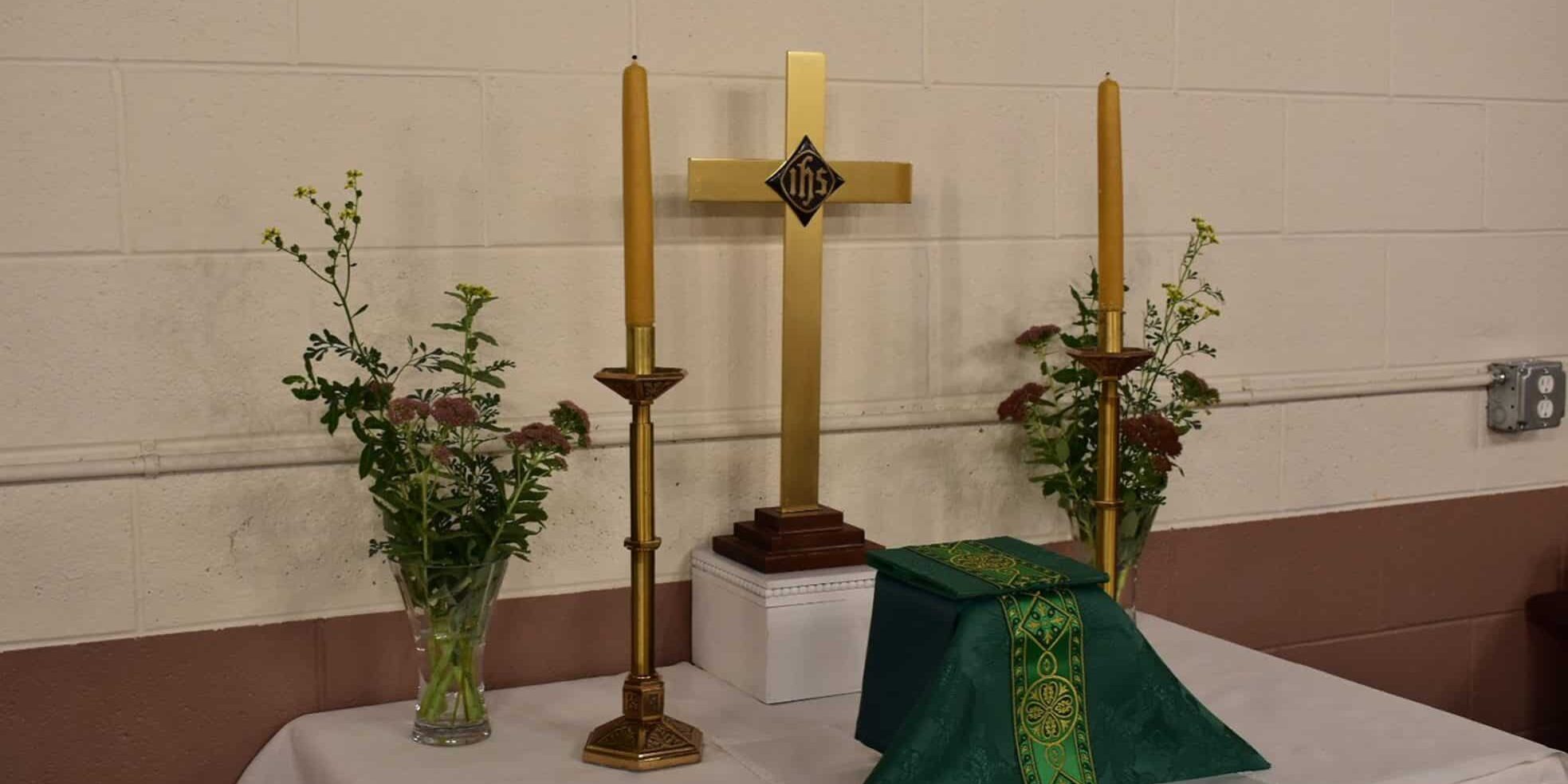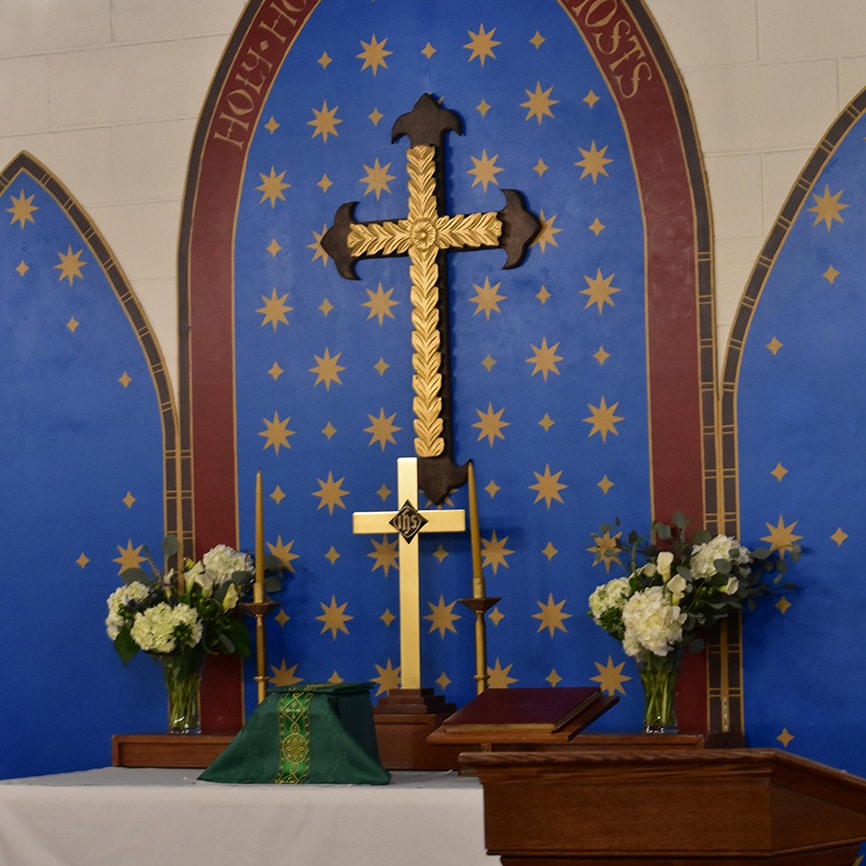Throughout the gospels, Jesus prepares his disciples for the difficulties they will face as His followers. In the latter Sundays of Eastertide the gospels lessons appointed come principally from John 16, which is known as the Farewell Discourse. In the Farewell Discourse Jesus prepares his disciples for two departures – the departure of his death, and then the departure of his ascension. The apostles are accustomed to following Christ, at this point. They take their ques from Jesus’ action and teaching. And this is not going to change when Christ departs out of the world. For it is not as though the disciples are then sent on their own way in their own wisdom. Rather, Jesus is deliberately preparing them to continue to follow His lead, even when he is not physically present with them.
The disciples’ initial confusion in response to Christ’s prophecy about his departure is quite understandable. Jesus tells them, “A little while, and ye shall not see me; and again a little while, and ye shall see me, because I go to the Father.” And all the disciples start whispering together, what does he mean, what is he talking about? Jesus tells them that they will weep in the seeming destruction of their hope. Our Lord’s passion and death will be a terrible blow against the disciples, as well. Jesus explains that they will experience the sorrow of living in a hostile world, and that their sorrow will be the world’s joy. When they are the most crushed, they will find the world to be the least sympathetic. The true hostility between the world and the kingdom of God will be on full display. But the world’s victory will not last. Christ has overcome the world and the sorrow of the apostles will turn to joy in the resurrection.
In this way, the resurrection becomes the basis upon which the Apostles are to engage with the world. The assurance of Christ’s resurrection and the hope of the resurrection of dead in Christ, give the Christian the tools to contend against the world’s lies and to withstand the world’s temptations and trials.
It is also in this Farewell Discourse that Jesus articulates the Christian principle to be “In the world but not of it”. Now, the phrase in the world but not of it, does not actually exist in the Bible, however, it is a distillation of Christ’s teaching about the disciple’s relationship to the world, particularly from this address in the Gospel of John.
Jesus tells the disciples, “If ye were of the world, the world would love his own: but because ye are not of the world, but I have chosen you out of the world, therefore the world hateth you.” and then after concluding his teaching to the disciples, he prays to the Father on behalf of the disciples saying, “I have given them thy word; and the world hath hated them, because they are not of the world, even as I am not of the world. I pray not that thou shouldest take them out of the world, but that thou shouldest keep them from the evil. They are not of the world, even as I am not of the world. Sanctify them through thy truth: thy word is truth. As thou hast sent me into the world, even so have I also sent them into the world.”
Thus, Jesus makes it quite clear that there is to be a distinction between his followers and the world they inhabit. The followers of Christ are of Christ, and just as the world rejected Jesus it will reject those who are of Him. We cannot be of the world and of Christ at the same time, there is no pleasing both sides.
This is what St. Peter describes as being strangers and pilgrims. “DEARLY beloved, I beseech you as strangers and pilgrims, abstain from fleshly lusts, which war against the soul”
To be of the world is to indulge fleshly lusts which contend against the spirit of God in us. To be of the world is to fight against the kingdom of God in our own bodies. The flesh wars against the spirit and the spirit against the flesh, as Paul says. We are to consider ourselves strangers and pilgrims. We are to think of ourselves as Abraham in Ur, or Jacob working for his uncle Laban, or the Israelites in the wilderness, none of these figures were comfortable in these locations, they didn’t settle in, putting down roots. They did not embrace the customs and practices of these places.
However, we are given plenty of examples where people did wrongfully embrace the culture into which they were called. The sons of Jacob became far too comfortable and settled in Egypt and it was their downfall. The allegory of the Christian soul is very instructive in this case. The children of Israel settled in Goshen in refuge from the famine. However, Israel knew they were pilgrims in Egypt, telling his sons to carry his bones back to Canaan. The Isrealites grew accustomed to the rich land and the favor of the Pharoahs and settled in for generations in a land which was not meant to be their home, and they ended up enslaved.
Similarly, the Christian soul is sent into the world, as a pilgrim, as a stranger, with a mission, just as Christ was sent. But immediately, the treasures and comforts of the world begin to drag the soul into a settled and familiar state. The Christian becomes comfortable in the world and ends up enslaved to their fleshly lusts. It takes divine intervention and the gift of the passover lamb to rescue such a soul. And for that soul, the resurrection becomes the defining feature of his identity. The Christian is a pilgrim because he is passing through on his way to the resurrection.
However, if we return to the farewell discourse, and Christ’s words regarding the Christian’s place in the world, we find that the classic phrase “in the world, but not of it” has perhaps too passive a construction. For we are not merely present in the world, waiting out a certain amount of time before being called to heaven. Christ says that we are sent into the world, just as He was sent into the world by the Father. We are in the world to perform a very particular and critical mission. Though the world is hostile, we are to wage war against the hostile forces by the power of the resurrection.
This is Peter’s focus in the epistle. It is the Christian witness to the world, the calling for which the church has been sent into the world, which must be preserved. We abstain from fleshly lusts as a part of our warfare on behalf of the Kingdom of God.
It is our righteousness in the world which is our great witness to the work of Christ. The epistle of Peter is written to a church which is under threat of persecution and is consistently slandered by her neighors. In chapter 4 Peter notes the non-Christian’s dismay that the Christians no longer participate in their debaucheries, and as a consequence have claimed that the Christians are a threat to their society. One might think of Paul’s trouble in Ephesus, where the tapering off of the Artemis idol trade, as a consequence of the influence of the Christians, was used to stir the whole city into an uproar. Peter, sees the abuse and spite leveled at the church, writing that they faced allegations of murder, theft, doing evil more generally and meddling in other’s affairs. In this context Peter encourages the church to be especially upright and good citizens. He exhorts them to obey the civil authorities, and to give no reason for their neighbors to suppose that they will cause unrest. In this way, the non-Christians will have nothing to say against them, and will be forced to confront their own falsehoods.
The Christians are to be the most exemplary citizens, for they know that this is the will of God. Because the Christian is not building his hope on what he can achieve and acquire in this life, he has every reason to support the civil authorities in the performance of their duties – to punish evildoers, and to praise them that do well. “For so is the will of God, that with well-doing ye may put to silence the ignorance of foolish men.” The Christian who is an exemplary citizen is a powerful witness to Christ’s work, says St. Peter. Do not only obey the rulers when it is to your benefit, submit to their authority for the sake of Christ. There is a common and quite silly saying, which is an exhortation not to be so heavenly minded, that you’re of no earthly good, is wonderfully answered by Hans Boersma, who says only those who are heavenly minded or of any earthly good at all. It is in our focus on heaven and life in the resurrection of Christ that we understand our responsibility and opportunity in this life. This is to be the Christian witness. The heavenly minded Christian is to quell the foolish allegations of his pagan neighbor by his willing submission to the authorities which God has put in place.
Peter summarizes with four imperatives: Honour all men. Love the brotherhood. Fear God. Honour the king. The Christian has a duty of honor for all men as created by God. That responsibility of respect becomes love within the people of God. Within the fellowship of the church we are made brothers with all men, and so our relationship becomes one of brotherly love. All of our relationships flow outward from our Fear of and love for God, who makes us brothers and who dignifies all men and particularly Kings who bear authority over us. This is how we are to live in the world but not of the world. We are to honor the earthly authorities, and to respect all men, but these responsibilities are derived from our fear of God and love for church. We are of Christ, children with Him of the Father and members of His body, but we have been sent into the world and as a consequence honor its structures and authorities. Give to Caesar what is Caesar’s, the temporal and earthly respect and obedience which he may claim, but give to God the fear and love which is at the center of your life.
For ultimately, though the world will continue to reject the Christian, continue to demand that the Christian be not merely pilgrim but become one with its ambitions and lusts, this will only last a little while. We can endure a great many things for a little while. Eternity with the King of Kings awaits us. Let us look forward in hope to that time when we shall see Our Lord again and be brought into His throne room.
We labor even now for His sake, and that we might receive the expression of His favor, “well done, good and faithful servant.”
May 11, 2025
Christ Church Anglican



